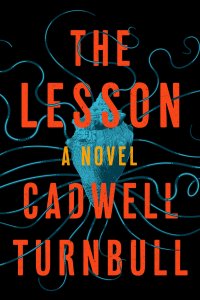Paul Di Filippo Reviews The Lesson by Cadwell Turnbull
 The Lesson, Cadwell Turnbull (Blackstone 978-1538584644, $26.99, 290pp, hardcover) June 2019
The Lesson, Cadwell Turnbull (Blackstone 978-1538584644, $26.99, 290pp, hardcover) June 2019
The nations of the Caribbean are so close to the USA, and share such a rich, tangled, fraught history with the States, that one would imagine many writers would have capitalized on the consanguinity to set their fantasies or futures there. And yet the bibliography at the handy website Caribbean SF lists titles for only thirty-some relevant novels. Another example of the ostensibly farsighted and farseeking genre not developing new narrative pastures and themes as readily as perhaps it should.
But with the publication of Cadwell Turnbull’s debut novel, the list is now one book stronger, and deepened. Turnbull’s novel combines a solid, modest gravitas, a homey quotidian ambiance, a sophistication of character development, and some genuine SFnal strangeness into a unique and savory gumbo.
The book falls into a subgenre of SF that has had some standout entries over the decades but which is really somewhat sparsely populated. The theme is aliens among us: not hidden, but announced and cohabiting. Not precisely the same as an alien invasion — overt warfare is not generally prominent in these tales — such books seek to depict a kind of colonization or refugee situation from the stars, with subtextual links to historical colonizing and/or refugee incidents. Michael Bishop’s Urban Nucleus series — soon to be reissued in a “director’s cut” version as The City and the Cygnets — is a landmark. The film and TV series Alien Nation brought the trope into other media. Currently Rick Wilber is examining such a scenario in the saga that began with Alien Morning. And Nancy Kress recently completed her allied Yesterday’s Kin Trilogy.
Turnbull, I bet, knows and has integrated all these works, for his novel does not indulge in any elaborate setup or infodumps, but just assumes the readers will grok such a scenario from the git-go. So he starts with his focus on the human protagonists, showing them to us for thirty or so initial pages in a kind of countdown to the moment the aliens, the Ynaa, land on the island of St. Thomas. A native of the region before taking up residence in the USA, Turnbull has the setting and citizens of St. Thomas in his bones and blood, and he conveys their reality to us gracefully, colorfully and with a minimum of hand-holding.
We have teenaged Derrick and his younger sister, Lee, living with their grandmother. Derrick is a curious, SF-loving kid, and arguably constitutes the center of our tale. His best friend and hopefully paramour-to-be is Patrice. Her folks are Jackson and Aubrey. Their marriage is disintegrating, and eventually a woman named Alice will become the third vertex of the triangle. We watch the interplay of emotions — desires and dreams and fears — among this cast. Then the Ynaa land, five years pass, and the main narrative begins.
About the Ynaa, from facts learned slyly in bits and pieces throughout the tale. They are alien in their natural configuration — gills, tentacles — but can shape their bodies with nano-tech (“reef” organisms) to appear perfectly human, though with something of an uncanny valley effect. In this form they are superstrong and nigh invulnerable. Their culture is one of dominance games and unmerciful retributions. Not proactively violent, they retaliate harshly when provoked.
The chief Ynaa from the story’s vantage, the “ambassador,” presents as a human female dubbed Mera. We learn that it was Mera who discovered Earth centuries ago, and who has lived here since, conducting secret researches into our planet and humanity, for selfish Ynaa purposes. (Here I’d like to ring in Michel Faber’s Under the Skin, for although Faber’s book concerns a secret invasion, not an overt arrival, the horror ambiance engendered by his aliens consorts at points with what Turnbull achieves.)
Mera comes to hire Derrick as her personal assistant, and this arrangement propels much of the subsequent action. There is burgeoning, albeit lopsided love between them — think Dozois’s Strangers and Tiptree’s exercises in exogamy — much public scorn and controversy, and eventually a cascade of actions whose fallout is a grim and brutal lesson, per the title. “The universe is bigger than you know… There is no armor big enough to save you. Nowhere. Ever.”
Turnbull illustrates life on the island and the patterns of culture that contribute to the climactic mini-apocalypse with sensitivity and flair. He charts the personal arcs of his characters — there are several other important figures I’ve not mentioned — with insight and ingenuity. His depiction of the Ynaa is creepy and otherworldly. We see a bit of their homeworld, their interactions among themselves, and also Mera’s backstory from centuries in hiding. And he sketches in the larger geopolitical impact of the alien presence as well. They gave us new technology as a kind of rent payment on St. Thomas, which has radically altered mankind’s life.
Ultimately, this deft, low-key, exacting, surprising, yet predestined story assumes the contours of the classic account of two cultures at cross-purposes, misunderstanding each other through a welter of good and bad intentions, tragedy resulting.
By the end, Derrick attains a certain sorry realization. “[He] wanted to touch the stars. He didn’t consider that they would touch back, that so many wouldn’t survive the price.” Turnbull’s assured and excellent debut is best summarized by a famous quote from T.S. Eliot.
After such knowledge, what forgiveness? Think now
History has many cunning passages, contrived corridors
And issues, deceives with whispering ambitions,
Guides us by vanities…
 While you are here, please take a moment to support Locus with a one-time or recurring donation. We rely on reader donations to keep the magazine and site going, and would like to keep the site paywall free, but WE NEED YOUR FINANCIAL SUPPORT to continue quality coverage of the science fiction and fantasy field.
While you are here, please take a moment to support Locus with a one-time or recurring donation. We rely on reader donations to keep the magazine and site going, and would like to keep the site paywall free, but WE NEED YOUR FINANCIAL SUPPORT to continue quality coverage of the science fiction and fantasy field.






